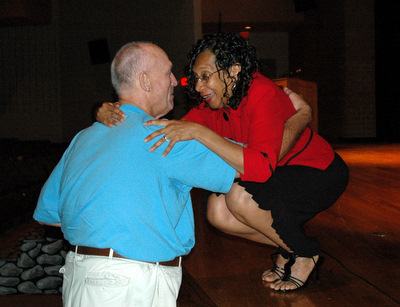
Albie Norris, left, hugs Joan Groves Briscoe. The two had not seen each other since graduating from Great Mills High School in 1959. (Submitted photo)
GREAT MILLS, Md. (June 26, 2009) — The documentary film “With All Deliberate Speed: One High School’s Story” premiered to a racially diverse audience of approximately 200 in the Great Mills High School auditorium last Thursday evening, bringing the local community together to discover the stories within the film. St. Mary’s College of Maryland (SMCM) professor Merideth Taylor produced the film, which gave voice to those who experienced desegregation at Great Mills High School between 1958 and 1972. Afterwards, members of the audience – some of whom had experienced this time period at Great Mills – made comments and asked questions of the panel.
One community member who spoke at the film’s end was Albie Norris, who had attended Great Mills with the school’s first two African-American students, Joan and Conrad Groves. Norris walked to the front of the audience and hugged Joan Groves – they hadn’t seen each other since graduation in 1959. “I said to Joan something all of us should have said 50 years ago: ‘Joan, welcome to Great Mills High School,’” said Norris.
“I felt I had grown as a person,” Norris said. “I didn’t do anything to welcome Joan in 1958. I’m sure it was difficult for her.”
The film outlined the difficult transition period of integrating the segregated high schools’ communities. George Washington Carver, now a middle school, was the school for African Americans, with Great Mills being the school for whites. Though the first black students were allowed into Great Mills in 1958, the county didn’t end the dual segregated system until 1967.
“Great Mills was desegregated, it was not integrated,” said Delores Fleming during the audience participation after the film.
“We were naïve in the ’50s,” said Norris. “Not one single teacher in the ’58 to ’59 school year talked to any one of us about how to welcome Joan and Conrad.”
The documentary was based on 18 oral histories drawn from more than 30 interviews with former teachers, administrators and students collected by Taylor with the assistance of students and teachers at Great Mills.
“People remember things differently because of the values they place on those memories,” said Taylor. “For some it was a positive time, and they were not always aware how different it was for others who had a more negative experience.”
“That's the way it was then, that's how people thought,”. Salvatore Raspa said in the film. Raspa is currently a member of the St. Mary's County School Board. “But this country has really progressed and St. Mary's County has really progressed."
With the Supreme Court ruling of Brown v. Board in 1954, the schools were required to desegregate. Another ruling in 1955, Brown II, demanded schools desegregate “with all deliberate speed.” St. Mary’s County began to make plans for desegregation, which met with resistance – Southern sympathies ran deep in the county. It wasn’t until Joan and Conrad Groves’ parents filed suit in 1958 that African-American students actually entered the “white” schools. Taylor documents this entire turbulent time period, through the racial tensions that rose in the early 1970s.
“We found that many students at Great Mills are unaware that their schools were ever segregated,” said Taylor. “And it may surprise even older folks to learn or remember how segregated the county once was.”
A grant from the PNC Foundation Legacy Project and the Maryland Humanities Council made the documentary possible. Additional support for the documentary project came from St. Mary’s College in partnership with St. Mary’s County Public Schools and the Unified Committee for Afro-American Contributions.
“Ending a Century of Segregation: One High School’s Story” was made possible by a grant from the PNC Foundation Legacy Project with support from the Maryland Humanities Council (MHC). The MHC is an affiliate of the National Endowment for the Humanities (NEH). Any views, findings, conclusions, or recommendations expressed in the documentary do not necessarily represent those of the PNC Foundation, the MHC, or the NEH.


